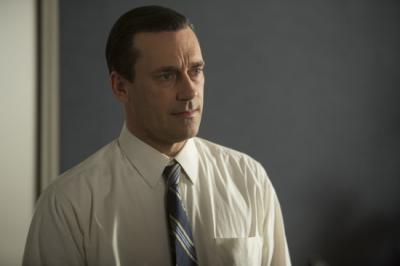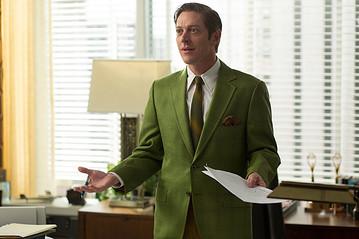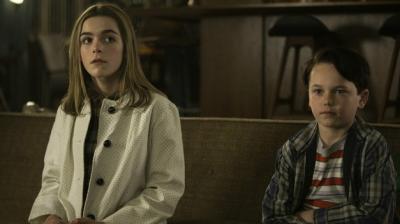Those confounded doorways keep popping up don’t they? Season 6 of Mad Men has been mostly that: a season of doorways. The premiere was literally titled “The Doorway.” In “The Collaborators” we saw Don reliving his past as he surreptitiously listened to Peggy give her ketchup pitch to Heinz. This week’s “The Crash” was again lousy with doorways. We have Jim Cutler stealing looks at Stan and Frank Gleason’s daughter having sex; Don chastising Ken Cosgrove for not getting him in the door to talk to Chevy; and Don lurking at the Rosen’s apartment door, leaving behind a detritus of cigarettes.
 And we have our narrative device to usher us back into the doorway of Don’s past: a harsh cough. Of course we know that Don (technically Dick Whitman) grew up in a whorehouse. We learn that when Don was sick his stepmother opted to just send him to the cellar so he didn’t infect the rest of them. She would rather forget about it and let the problem resolve itself without getting her hands dirty.
And we have our narrative device to usher us back into the doorway of Don’s past: a harsh cough. Of course we know that Don (technically Dick Whitman) grew up in a whorehouse. We learn that when Don was sick his stepmother opted to just send him to the cellar so he didn’t infect the rest of them. She would rather forget about it and let the problem resolve itself without getting her hands dirty.
Well, Don had to get mothering from somewhere; so he receives that care from a whore. After the whore eradicates Don’s ailment, she naturally decides to deflower young Dick Whitman. When his step-mom finds about it, she violently beats Dick, shouting things at him like: “You’re a filthy, disgusting pig!” Don has evidently been harboring this inside him, afraid to confront it.
Don isn’t the only one who is afraid to confront undesirable emotions this week. Fortuitously, Jim Cutler has hooked up everyone up with a doctor who gives them a “complex vitamin super dose” that acts as some kind of equivalent for speed. Everyone is running around the office frenetically and talking a blue streak. But that’s not it. Jim Cutler has also brought Frank Gleason’s daughter to help you avoid your problems, and she is trafficking in sex. “I’m here to make you feel better,” she literally and suggestively tells Don.
 Stan actually takes advantage of both of these offerings. He is trying to forget about death, mainly the death of his cousin in Vietnam. In his excited mood, he begins to hit on Peggy, but Peggy is wise to the situation. “I’ve had loss in my life,” she says. “You have to let yourself feel it. You can’t dampen it with drugs and sex. [1] It won’t get you through.” Peggy’s new affair, Ted, is actually of the same mentality. He takes time-off to grieve over his friend, Frank Gleason’s, death.
Stan actually takes advantage of both of these offerings. He is trying to forget about death, mainly the death of his cousin in Vietnam. In his excited mood, he begins to hit on Peggy, but Peggy is wise to the situation. “I’ve had loss in my life,” she says. “You have to let yourself feel it. You can’t dampen it with drugs and sex. [1] It won’t get you through.” Peggy’s new affair, Ted, is actually of the same mentality. He takes time-off to grieve over his friend, Frank Gleason’s, death.
Things aren’t exactly auspicious on the Chevy account. Creative has given them seven different angles in just six weeks, and Chevy isn’t interested in any of it. Here’s what they’re interested in: the parent/child dynamic. Everyone at the office is anxiously trying to put together copy for Chevy. Don is exhuming an old campaign that they did for Oatmeal (“Because you know what he needs”) featuring artwork of a mother and her son, determined to find the answer to “open the door.” “The history can’t be ignored. It should not be ignored,” says Don, and he still hasn’t put together the profundity of that statement yet.
Of course, Don isn’t talking about Chevy. He doesn’t have time for art. He is just trying to salvage his affair with Sylvia, who desperately wishes he would just leave her alone. He even calls in Peggy and Ginsberg to bounce off ideas with them. Why? Because this is important! This is “bigger than a car.” This is “everything.”
It’s interesting to see Don conflating his art with his personal life. The facile answer is that Don cares more about his affair than about his work. That is undeniably true, but I think it’s more than that. Your personal life fuels your art. Artists know this. Don knows this. All of his best ad work is potent because it is drawn from his own anguish. But sometimes the process is inverted: Your art fuels your personal life. You start extrapolating stratagems to win back your mistress on the basis of retrograde Oatmeal slogans.
Bobby Draper one-liner of the night: “Are we Negros?”
Sally is confronting a piece of history that is dubious to say the least. A black woman covertly enters their apartment (both Megan and Don are working) and purports herself to be Sally’s grandmother. The woman says she helped raise Sally’s dad, referring to him as “Donald Draper.” Sally knows about Dick Whitman. She should have known that if this woman truly did help raise him, she would have called him “Dick.”

But it isn’t Sally’s fault. As she tells her father, “I know nothing about you.” Don tells her to join the party and “forget about it.” “I left the door open,” he says. “It’s my fault.” After Don learns about the robbery, he suffers the titular crash. And it was that physical door he left open, that led him to confront the mental door of his past. As Peggy pitched for Chevy, “The child is the father of the man.” [2] When Don subsequently sees Sylvia in the elevator he curtly responds that he has been “busy.”
Does this mean Don is going to be faithful to Megan now, and that he is going to stop whoring around? Will he forgo the alcohol and sex that has sustained him through the years? Don also told Ted that he will not contribute any more copy for Chevy, placing the burden solely on Ted. What's going on here?
More than ever, he is beginning to identify how empty his lifestyle is leaving him. Still, it’s one thing to identify it and quite another to change. This being Mad Men, I don’t expect any happy endings.
This episode was kind of a letdown from last week’s masterpiece. It was one of the few episodes of Mad Men that actually felt predictable. From the title alone, it was patently obvious that Don was going to crash from his high. It wasn’t multi-layered like the best episodes of Mad Men. Everything was tied to the notion of history. Usually, I have to re-watch certain scenes and work out some of the subtext of the episode, but everything was very immediate this week. I was practically writing this review as I was fast-forwarding through the commercials.
And, as in “The Collaborators,” I did not feel the flashback scenes added anything to understanding of Don Draper. I was much more fascinated by the workings of the office. I know they were working in the whole history subtext, but it was once again disappointingly hackneyed.
Additional notes:
Ken’s crash is in an automobile: The maniacs at Chevy, one of which toting a gun, force him to drive their Impala recklessly.
Where did Ken learn to dance like this, you ask? His mother, actually no, it was his first girlfriend. Either way, it’s in his history.
Here’s your weekly dose of Mad Men pessimism:
- Sylvia: “I want you to try and be happy.”
Don: “About what?”
- “I wanna hear your heart,” says Frank Gleason’s daughter inscrutably. She walks up to Draper and puts the stethoscope on his chest. “Oh, I think it’s broken.”
Don Draper: “You can hear that?”
- Stan: “Do you feel anything? ‘Cause I don’t.”
Ted describes Gleason as a “piece that cannot be replaced” which is how Don was yearning to feel.
